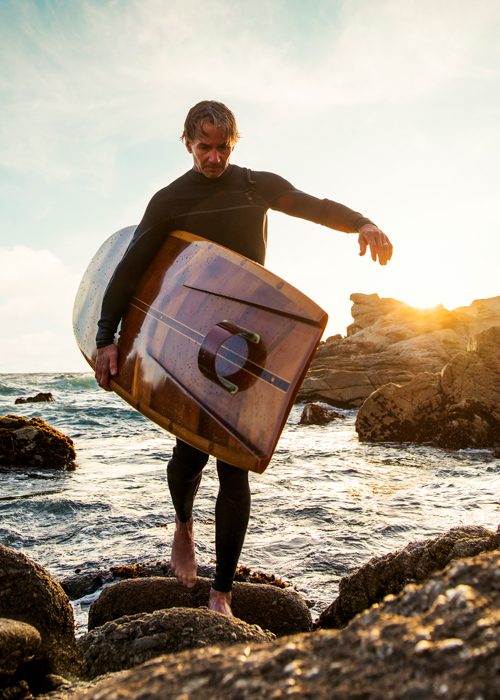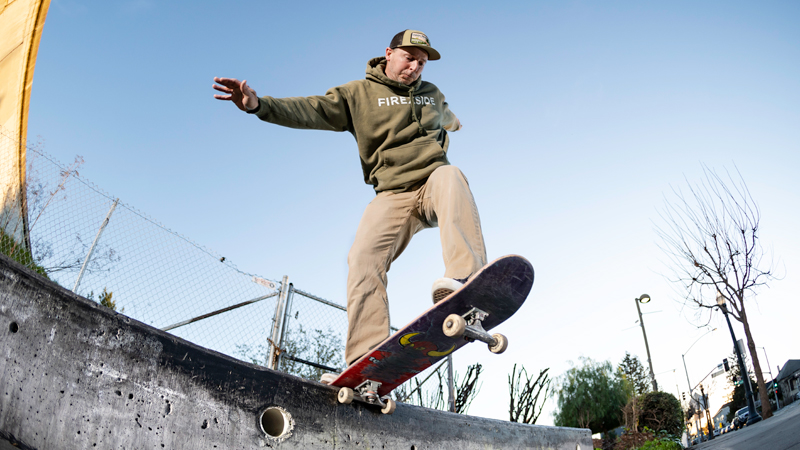This month, we’re heading outdoors with the best drinks for the backyard, beach, and beyond. In Take It Outside, we’re exploring our favorite local spots and far-flung destinations that make summer the ultimate season for elevated drinking.
When Paul Clifton was a teenager growing up in Salinas, Calif., he knew which way the wind was blowing by following the scent of chocolate from a nearby factory. He used this as a clue to the day’s surfing conditions — his first passion was out in the waves of the Pacific. As director of winemaking for Hahn Family Wines in the Santa Lucia Highlands, his other passion is now in the vineyard, where his surfing knowledge has proven unexpectedly applicable.
“As a surfer, you are really tuned in with the weather,” says Clifton. Understanding the fog, wind, and sun gave him perspective on weather patterns that impact not only the surf, but also the vines. “If the wind is hard onshore, that’s not good for surf, and it also will shut down the grape,” he says.

Growing Up Skating and Surfing
“Skating evolved because of surfing,” says Clifton, who learned both sports from his older brothers, one of whom makes skateboards and skateboard trucks (mounts that keep the wheels attached to the deck) that imitate the feel of surfing.
Clifton isn’t the only California winemaker to come to the profession from a surfing or skating background. Kenny Likitprakong of Hobo Wine Company and Ryan Zepaltas of Copain Wines also have skating in their blood, while Kip Lorenzetti of Chronic Cellars and Rob Takigawa of Baileyana are dedicated surfers. “When you grow up on the coast, in Carmel, it’s what you do,” says Takigawa.
Lorenzetti was raised in the mountains, skating and snowboarding whenever he could. He came to surfing in his late teens, also influenced by an older brother. He says that the humility one gains from these sports puts the “ego in check” even if all the skills are in the right place. “If you are ever feeling high and mighty, get ragdolled,” says Lorenzetti. Being humble is part of winemaking, too. “The vines don’t care” about clout or achievement, he says.
With the perspective offered by 20 vintages under his belt, Takigawa agrees that spontaneity and humility are essential in both winemaking and surfing. “You go with what you are given,” he says. “Mother Nature doesn’t care about us.”

A Creative Impulse
Likitprakong says that, other than his friends and family, skating has been the “most formative” thing in his life. “If I could have been a pro skateboarder, I would not be making wine,” he says. When he started his wine business in 2002, he considered it to be “a skateboard company that made wine instead of skateboards.” In its early days, Hobo Wine Company was unconventional and drew influence from the skateboarding world, which Likitprakong says was risqué back then. Now, this inclination toward pure authenticity shows up in the brand’s mission through its reduced environmental impact and contributions to social causes. The brand even hosted a skate jam for charity in 2012.
Zepaltas also finds that wine and skating both satisfy a creative impulse, allowing for authenticity and fresh ideas. “The output starts in your mind,” he says. Whether the intention is a string of tricks for a video, or visualizing the wine he wants to make, he finds it rewarding to see these aims arrive into the world for others to enjoy.
Lorenzetti has a similar perspective on the satisfying parallels between being on the board and in the cellar. Making a “blow-your-hair-back wine” is like “catching a kickflip midair or nailing a backside wave,” he says.
With surfing and skating, however, it’s usually possible to get “just one more” attempt if a mistake is made, while winemaking doesn’t offer many second chances, says Lorenzetti. But there is an attitude that helps with that, instilled in the mindset shared by these surfers and skaters, according to Takigawa: “Take your job seriously, but you can’t take yourself seriously.”
